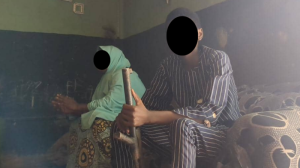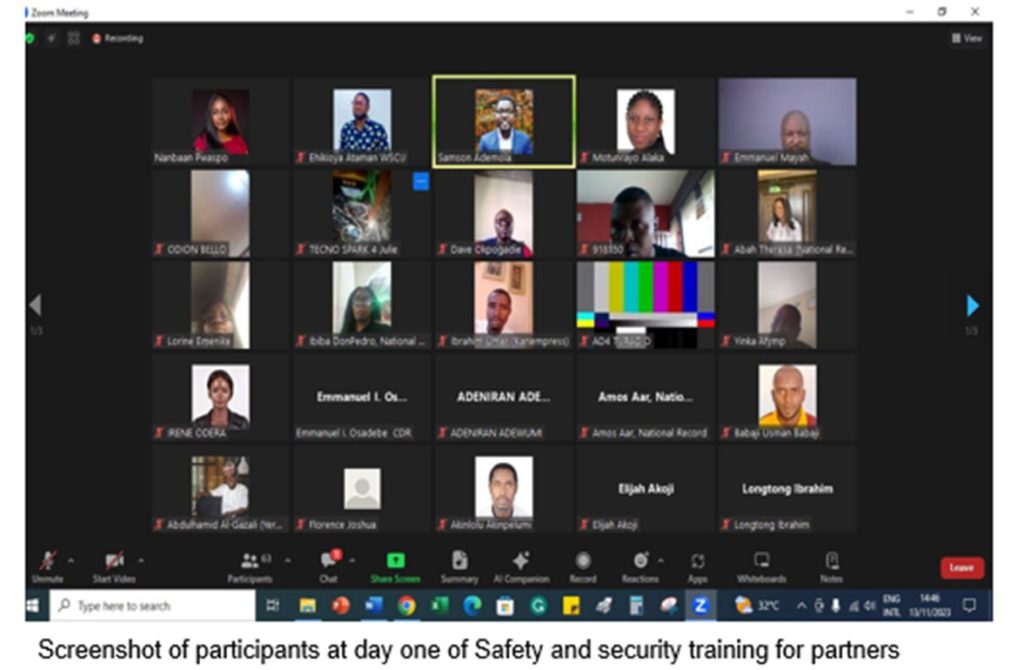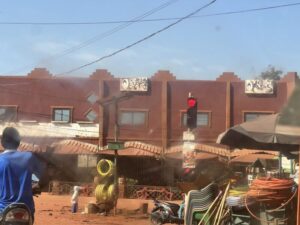The Wole Soyinka Centre for Investigative Journalism (WSCIJ) organised a two-day capacity building on safety and security for journalists from the 26 media organisations under the Collaborative Media Engagement for Development, Inclusivity and Accountability (CMEDIA) project.
The training designed to improve the overall cyber safety, digital security and personal safety of journalists became necessary amid the continued threats to the security, journalists’ safety and press freedom in Nigeria. Motunrayo Alaka, Executive Director/CEO, WSCIJ, revealed that the training targeted the enhancement of journalists’ capacity to handle their safety and well-being in the line of duty.
On day one, Elizabeth Kolade, CEO of Resilience Technologies Africa, discussed digital security and understanding various forms of cyber threats and the vulnerability of individuals and organisations to cyber threats. Represented by Nanbaan Pwaspo, the Cybersecurity expert noted the importance of practising digital security to protect personal and sensitive data online.
Addressing media owners, she underscored the importance of risk assessment on files that are considered sensitive. She highlighted the importance of managing access to vital and sensitive information. Nanbaan also emphasised the need for regular review of access and password changes, physical office security, and the role of human networks in security as malware often infiltrates computers through download of unlicensed software, clicking on malicious links or adverts and downloading email attachments through social engineering attacks.
Deji Badmus, CEO, ofTV360 during his session noted that every reporter must know the importance of understanding the community if they intend to carry out an investigative report. He said proper research and the use of fixers can help navigate the terrain.
He advised journalists to arrange for armed security when necessary. Badmus suggested that journalists on investigative assignments must be discreet by deploying smart gadgets while on duty. While sharing other safety tips, Badmus advised reporters to have their identity cards and consult with local authorities while on assignment. He stressed the importance of building relationships with community leaders and residents to gain insightful access.
On day two of the training, Esther Adekoya, President of Heartrose Care Foundation, discussed the mental health of journalists and media professionals. She emphasised the importance of prioritising well-being and mental health for individuals within an organisation. Addressing the prevalence of mental ill health and mental illness among journalists that she attributed to the demanding nature of work, meeting deadlines and exposure to traumatic events, she urged journalists to normalise the need to seek help when necessary. She differentiated between mental ill health and mental illness. Adekoya stressed the need for prompt intervention and highlighted the effects and costs of mental health issues on individuals and workplace productivity. She appealed to organisations to support staff battling mental health problems and provided tips for maintaining good mental health.
Yusuf Alli, Managing Editor, The Nation Newspapers (Northern Operation), who presented a paper on ‘How to do great stories and avoid legal pitfalls,’ noted that journalists must be conversant with existing and relevant laws and statutory provisions to avoid litigations. He stressed the importance of great stories, their characteristics and benefits while giving vivid examples. He highlights the need for proper reporting and due diligence to avoid pitfalls, such as false or bad stories, sponsored news, and agents selling incomplete documents. Alli also emphasised the importance of writing fair and balanced stories to avoid conflicts of interest and legal issues. In his conclusion, he noted the importance of truthfulness and reliability in journalism, source verification, and factual reportage as journalists were encouraged to produce stories that will benefit society and enhance their professional development.
Over 70 journalists from the 26 media organisations under the CMEDIA project participated in the two-day event.

Chronicles of Kidnap Survivors (II): Kaduna Teenager Learned to Shoot at 14 Because ‘Kidnappings Happen Everyday’
In March 2024, when the attention of Nigerians was drawn to the abduction and eventual release of 137 schoolchildren in Kuriga, Kaduna


